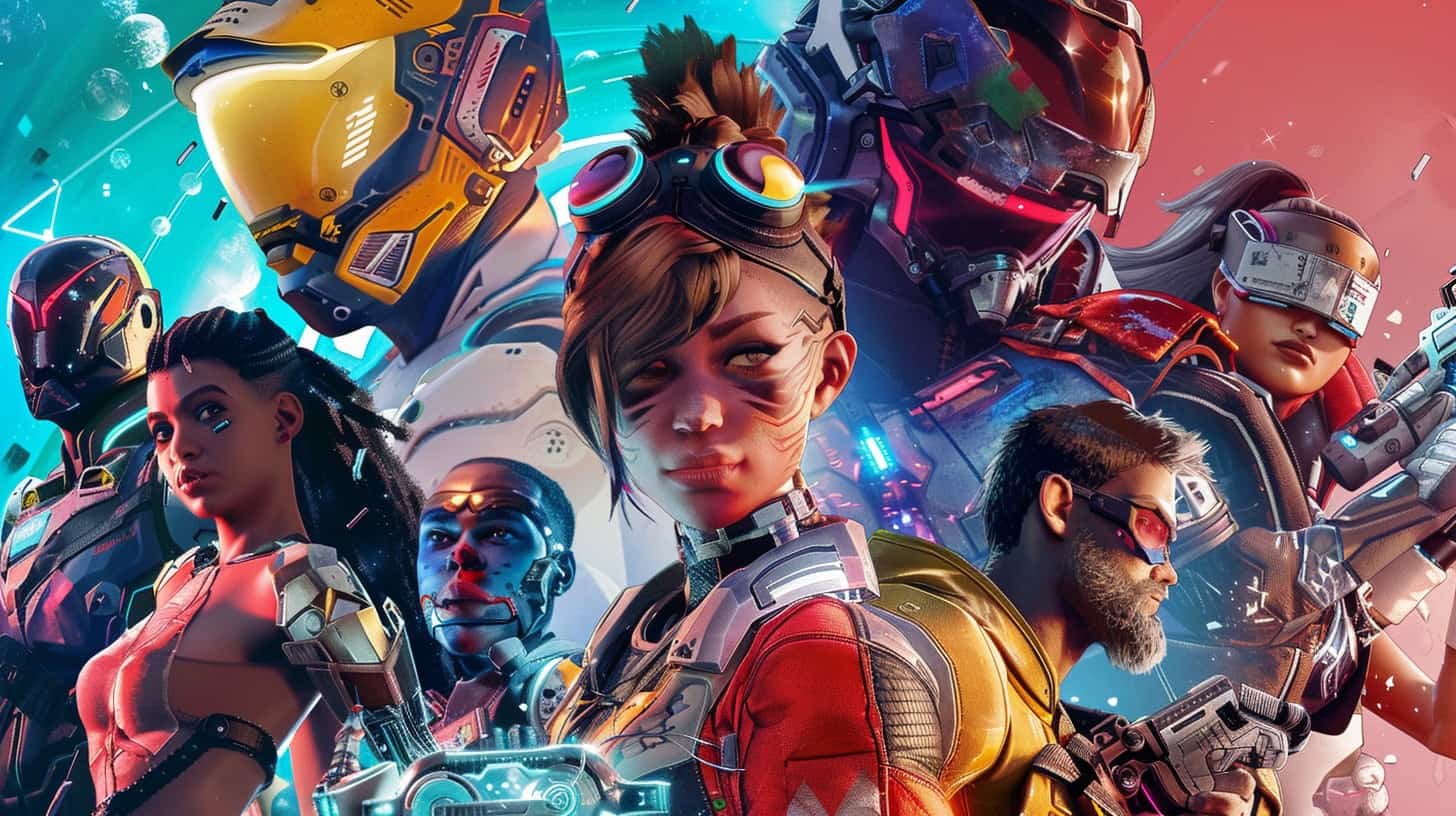Choosing the right video game can be tricky. You want a game that fits your interests. This guide offers a detailed look at various video game genres, from role-playing games to puzzle games, and everything in between.
Get ready for fun!
Key Takeaways
Video games come in many types, like action games, role-playing games (RPGs), and puzzle games. Each type offers a different way to play.
Action games test quick thinking and reflexes with challenges like fighting enemies or jumping over obstacles.
Role-playing games let you experience stories where you can be a hero on big quests and improve your character as you explore new lands.
Puzzle and adventure games focus on solving puzzles and exploring stories without needing fast reflexes.
Simulation games give players control over virtual worlds, from building cities to living out life simulations or flying planes.
Table of Contents
Comprehensive Overview of Video Game Genres

Jumping straight into the core of video game genres, we uncover a universe where gameplay characteristics take center stage. Video games have evolved from simple action challenges to complex narratives and mechanics spanning across multiple genres and subgenres.
From first-person shooters that offer adrenaline-pumping experiences to the strategic depths of real-time strategy games, there’s an online game for every mood and preference. Action games, standing as perhaps the most diverse category, cover titles that demand quick reflexes and coordination—think Doom or Apex Legends for those who thrive on intensity.
Exploring role-playing games (RPGs), players immerse themselves in detailed worlds rich with lore and character development. Here, titles like World of Warcraft demonstrate the allure of massively multiplayer online adventures, while sandbox RPGs like The Sims allow for unparalleled creativity in open-world settings.
Strategy fans find satisfaction in turn-based battles as seen in Final Fantasy or commanding armies in RTS masterpieces such as StarCraft II. Each genre offers a distinct blend of engagement, challenging gamers to either act swiftly or plan carefully.
Puzzle solving takes a front seat within puzzle platformers and logic games—Portal being a prime example, where physics bend to the whim of player ingenuity. Meanwhile, adventure game aficionados relish deep storytelling found within graphic adventures and interactive movies; their structures vary greatly but converge on delivering compelling narratives without demanding fast-paced action.
For those seeking realism or aspiring pilots, vehicle simulation games provide near-authentic experiences, from racing simulations to flight simulators. Life simulation games replicate aspects of daily living, with titles like Animal Crossing serving cozy slices of life, allowing players to escape into comforting routines.
This comprehensive overview underscores not just variety but depth within each genre. It highlights how, regardless if one seeks thrilling combat scenarios offered by shooter games or prefers the methodical decision-making characteristic of strategy video shooting contests—the gaming landscape is vast enough to cater to all preferences without exception.
Exploring Action Games
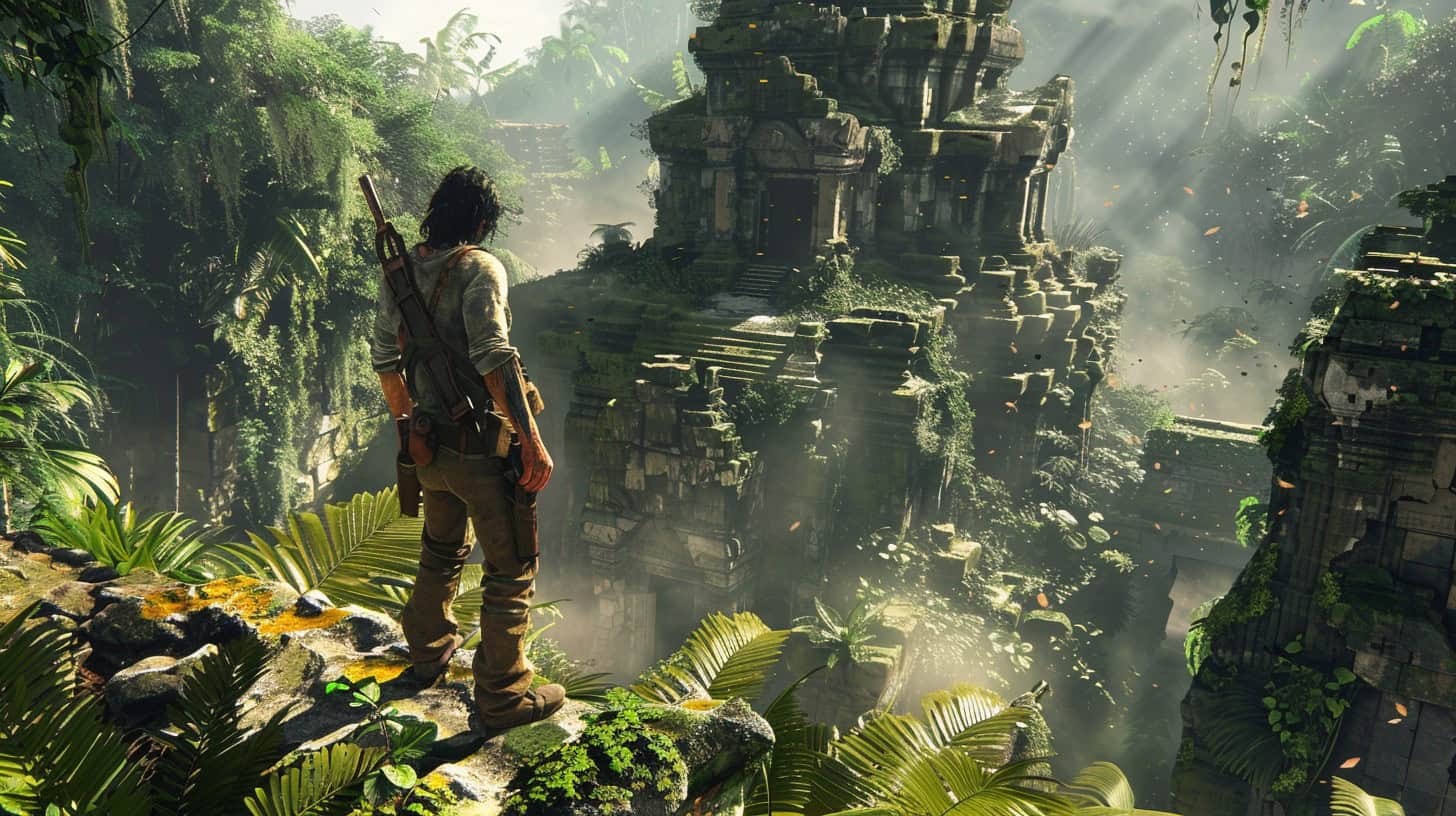
Action games test your reflexes and quick thinking. They bring you into worlds where you fight enemies, jump over obstacles, and solve fast-paced puzzles.
Platform Game Insights
Platform games throw players into worlds where jumping and climbing are key. Think Donkey Kong and Super Mario Bros.—icons that define the genre. These games focus on moving up or across suspended platforms, often with enemies or obstacles in the way.
Players must leap, dodge, and sometimes fight to progress. The goal? To reach the end of each level, usually marked by a significant challenge or boss fight.
Let’s not forget, these adventures demand precision and timing. Every jump counts. You learn patterns, master controls, and navigate through carefully designed levels packed with secrets.
It’s thrilling to discover hidden areas or shortcuts that make your journey easier—or more rewarding. And whether it’s collecting coins in Super Mario Bros., exploring sandbox game landscapes for hidden treasures, or facing off against giant bosses at every turn—these experiences stay with you.
In platformers like Donkey, cringe-worthy leaps of faith aren’t just common; they’re part of what makes each victory so sweet.
Shooter Game Types
Jumping from platform games to shooter games changes the pace. These games focus on using guns and other weapons from a distance.
- First-person shooters (FPS) immerse players into the action as if they are the character. Players see the game world through the eyes of their character. Examples include “Call of Duty” and “Halo Infinite.”
- Third-person shooters offer a view from behind or over the shoulder of the character. This type lets players see their characters move in the game world, like in “Splatoon.”
- Hero shooters mix team-based play with unique characters, each with their own abilities and weapons. Games like “Overwatch” showcase this sub-genre.
- Tactical shooters require players to think and plan before acting. They often simulate realistic combat scenarios, demanding strategy more than quick reactions.
- Rail shooters automate character movement, allowing players to focus on targeting and shooting enemies as they appear on screen.
- Bullet hell or danmaku games flood the screen with enemy fire that players must dodge while attacking back, pushing player skill and reflexes to the limit.
Each type offers distinct challenges and gameplay experiences, ensuring fans of shooting actions find something that fits their preferences perfectly.
Fighting Game Dynamics
Moving from shooter game types, fighting games bring players closer to the action. Mortal Kombat and Street Fighter lead with intense close-ranged combat. These titles excel in modern gaming by focusing on precise moves and quick reflexes.
Players master combos and special attacks in heated duels. Super Smash Bros expands the genre by mixing characters from various universes in fast-paced battles.
Fighting games require understanding opponent tactics to win. Each character has strengths and weaknesses, making choice critical for victory. Real-time combat demands sharp reactions and strategy adaptation.
Fans enjoy these dynamics, proving skill in multiplayer arenas online or locally.
Stealth Action Game Features
Shifting from fighting game dynamics, we enter stealth action games. These games focus on avoiding fights. Instead, players use strategy to sneak around enemies. Famous series like Metal Gear and Sly Cooper show how this works.
Players hide, move quietly, and avoid getting caught. This makes the game exciting and challenging.
In these games, every move must be silent and careful. Players plan their path to stay out of sight. They look around corners with a camera and listen for sounds that reveal enemies nearby.
Gadgets play a big role too. Players might use noise-making devices or smoke bombs to distract guards. The goal is always clear: get past without anyone knowing you were there.
Survival Game Challenges
Survival games drop you into harsh environments with very little to start. You might find yourself in a dense forest or stranded on an island, like in “The Forest” and “Ark: Survival Evolved”.
Here, gathering resources is key. You’ll need to hunt for food, build shelters, and make tools to stay alive. The challenge ramps up as players face threats from wild animals, changing weather, and even other players eager to steal their hard-earned supplies.
Games such as “Subnautica” and “Rust” push survival skills further by adding unique twists. In “Subnautica”, exploring underwater biomes adds the thrill of discovering unknown creatures while managing oxygen levels.
Meanwhile, “Rust” focuses on player interactions—forming alliances or engaging in combat—to secure resources and territory. These elements ensure every playthrough challenges your ability to adapt and survive in open-world settings that test your resourcefulness at every turn.
Defining Action-Adventure Games

Action-adventure games blend excitement and story. They take you on quests, mixing fighting and puzzles.
Survival Horror Game Elements
Survival horror games put players in settings filled with fear, like the spooky worlds of Resident Evil and Silent Hill. Players face puzzles, scarce resources, and unknown dangers.
They must manage limited ammo and health kits to survive against monsters or ghosts. These games also use dark visuals and eerie sounds to make everything more scary.
Games like Back 4 Blood and State of Decay 3 show how players work together or stand alone to live through zombie outbreaks or ghostly haunts. Success means clever planning, quick thinking, and keeping calm under pressure.
The true test is not defeating a monster but surviving the nightmare.
Let’s explore insights into Metroidvania games next.
Insights into Metroidvania Games
Metroidvania games pull you into vast, interlinked worlds where every path, room, and corridor has a purpose. Games like Hollow Knight and Metroid Prime set the gold standard. They mix exploration with puzzle-solving.
Imagine wandering through a giant maze that only makes sense after finding new gadgets or skills. This isn’t just about moving forward, but also revisiting old spots with new abilities to uncover secrets or unlock shortcuts.
Players love the thrill of discovery in these open-world, action-adventures. The joy comes from piecing together how everything connects — much like solving a giant jigsaw puzzle without seeing the picture first.
Success hinges on keen observation and recalling which areas were out of reach before acquiring specific upgrades. It’s this cycle of exploration, combat improvement, and backtracking that defines the genre, ensuring each playthrough offers fresh challenges and surprises.
Adventure Game Genres
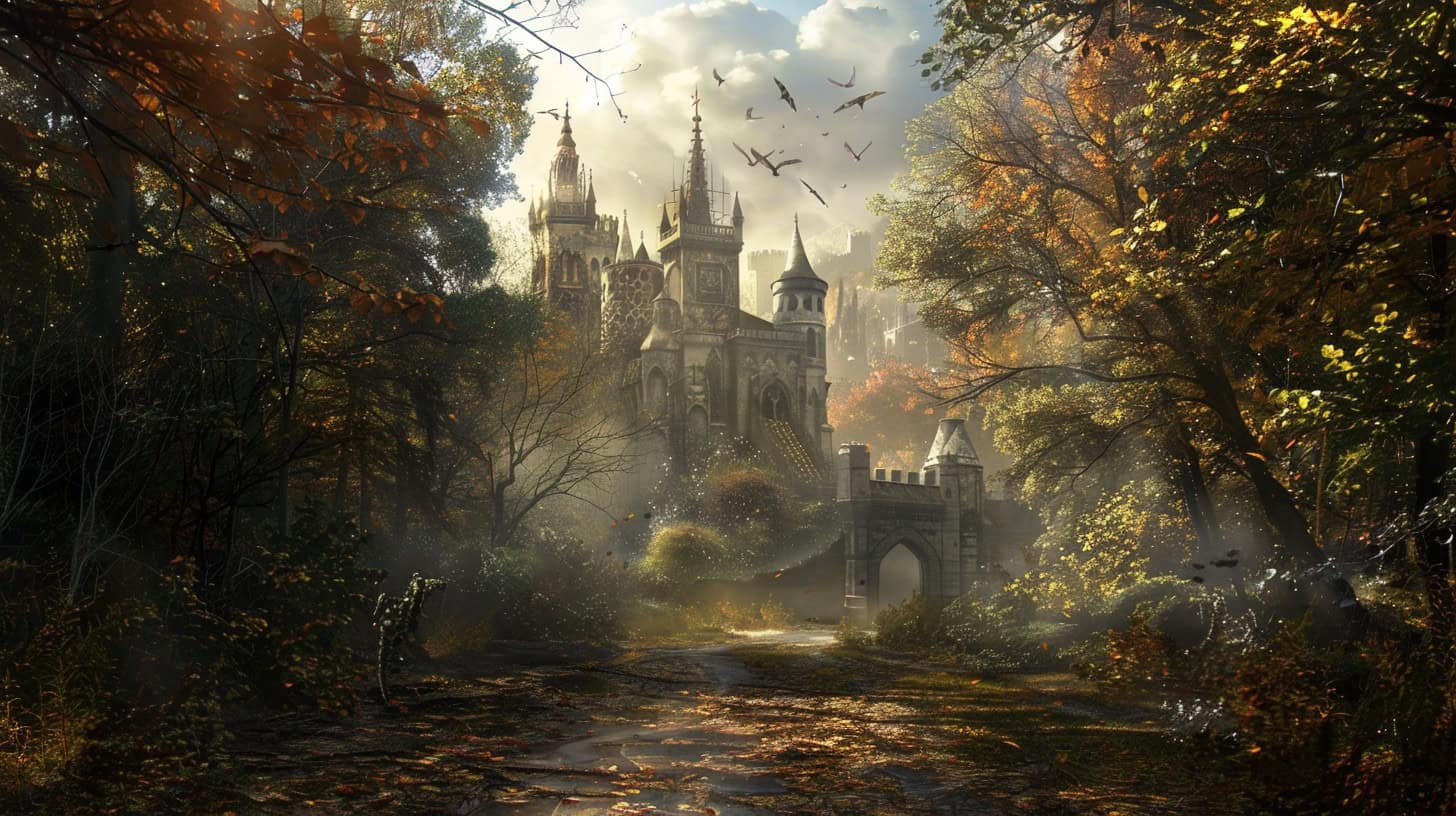
Adventure games let you explore new worlds and solve puzzles. They bring stories to life, from finding hidden objects to choosing your own adventure in visual novels.
Graphic Adventure Game Styles
Graphic adventure games pull players into stories using visuals and choices. They replace text descriptions with graphics, like in “The Silent Age” and “Sherlock Holmes: The Devil’s Daughter”.
- Point and click adventures require players to solve puzzles by interacting with on-screen objects.
- Visual novels blend narrative with limited gameplay, offering branching storylines based on player decisions.
- Interactive movie games use video clips for storytelling, letting players choose paths that affect outcomes.
- First-hand experiences in puzzle-platform adventures combine jumping puzzles with environmental storytelling.
- Text parsers have evolved; now, players select actions from menus instead of typing commands.
- Real-time 3D adventures immerse players in explorable environments, emphasizing discovery over action.
- Graphic adventures often feature episodic stories, releasing new chapters over time to advance the plot.
- Many involve inventory puzzles where collecting items is key to solving game challenges.
- Detective games within this genre require gathering clues and solving mysteries through conversation trees and investigation.
- Exploration is crucial; players uncover hidden areas and secret paths to progress in the game world.
Each style engages gamers differently, inviting them into unique worlds filled with intriguing challenges and captivating stories.
Text Adventure Game Mechanics
Text adventure game mechanics are all about using simple commands to explore stories and solve puzzles. In these games, players type in commands like “go north” or “pick up key” to move through the game.
Games such as A Dark Room, AI Dungeon, and Zork have set the stage for this genre. These games challenge you to think creatively as you use text inputs to interact with characters and environments.
Unlike graphic-centered video games, text adventures rely on written descriptions—making imagination key. You read details about each location or object and decide your next step based solely on this information.
This gameplay creates a unique experience where your decisions shape the story’s path forward. Such interactive fiction tests your problem-solving skills and draws you into deeply crafted narratives without visual aids.
Visual Novel Game Features
Visual novels stand out by using mostly static graphics, creating an experience like reading a mixed-media novel. Games like Zero Escape and The Death Trap pull players into stories where choices matter.
These games mix images, text, and sound to tell engaging tales. Players often decide the story’s path, leading to different endings.
In visual novels, every click can change the outcome. They blend reading with critical thinking and problem-solving. Fans of puzzle video games or those who enjoy rich narratives dive deep into these experiences.
Next up: Interactive Movie Game Design explores how players shape stories through their actions.
Interactive Movie Game Design
Interactive Movie Game Design brings movies and games together. Creators use pre-filmed sequences, like in Batman: The Telltale Series. Players decide what happens next, making each play unique.
These games focus on story over action. Choices matter more than quick reflexes.
Fans of deep stories enjoy these adventures. They mix cinema with gameplay to craft engaging tales where you control the outcome—like choosing your adventure book but with film-quality visuals and sound.
Now, let’s shift gears to Real-Time 3D Adventure Games.
Real-Time 3D Adventure Games
Real-time 3D adventure games bring players into a vivid, free-roaming world where they can explore at their own pace. Starting in the late 1990s and early 2000s, these games have grown to include titles like Sherlock Holmes: The Devil’s Daughter and Adventure Time: Finn & Jake Investigations.
They mix action role-playing elements with immersive storytelling, letting players fully explore rich open worlds full of mysteries. Players control characters that interact with the environment and other characters to solve puzzles and complete tasks.
In these games, every decision can change the outcome of the story, making each player’s experience unique. By using real-time strategy gameplay mechanics, gamers get a blend of quick-thinking and careful planning to advance through levels or defeat foes.
Examples showcase a wide range of settings, from detective stories in London to fantastic adventures in lands full of magic. Explore Role-Playing Games (RPGs) next for even more immersion and character development opportunities.
Dive into Role-Playing Games (RPGs)

Role-playing games let you take on epic quests and battle monsters. You’ll choose your path, improve your hero, and explore vast lands.
Action RPG Characteristics
Action RPGs blend real-time combat with elements from action games. Players control a character, fighting enemies and exploring new places. These games, like The Witcher 3: Wild Hunt and Cyberpunk 2077, offer thrilling adventures.
They let you gain experience points to make your character stronger.
In these games, choices matter. Your decisions can change the story and world around you. This makes every playthrough unique. Games such as Nier: Automata show how deep stories mix with fast-paced battles for an unforgettable experience.
MMORPG Universe
Moving from action RPGs, MMORPGs stand out for their vast online worlds. In these games, thousands of players interact in a persistent universe. Games like World of Warcraft and Final Fantasy XI set the standard.
They run on game servers that keep the world alive 24/7. Players can explore, fight, and join forces with others in real-time.
These universes are not just big; they’re filled with endless adventures and challenges. Players choose roles that fit their style—like warriors or mages—and work together to tackle quests or battle other players.
For example, The Lord of the Rings Online lets fans live inside its epic fantasy world. It’s all about teamwork, strategy, and living another life online.
Roguelike Game Traditions
Shifting from the vast worlds of MMORPGs, roguelike games bring a unique challenge. These games are all about exploring dungeons in two dimensions. Players face new layouts every time they play because of procedural generation.
This means each adventure is different. The thrill comes from permadeath – if you lose, you start over.
Roguelike video games like NetHack and Enter the Gungeon stand out for their randomness and high stakes. They mix puzzle elements, strategy, and fast-paced action into one experience.
Fans love unlocking secrets and mastering these ever-changing dungeons.
In roguelikes, every playthrough is a new story waiting to be written.
Tactical RPG Strategies
Tactical RPGs mix strategy video game logic with role-playing elements. Games like Final Fantasy Tactics and Disgaea stand out. Players lead a team on a grid, thinking ahead to win battles.
Each choice matters—where you move, how you attack, and what skills you use.
These games demand smart planning and an understanding of each unit’s strengths and weaknesses. You’ll spend hours mastering tactics in fantasy or modern worlds. Fans of deeper gameplay get hooked on the challenge these titles offer, making every victory rewarding.
Sandbox RPG Worlds
Sandbox RPG worlds offer players vast freedom to explore, create, and live out adventures at their own pace. Games like The Elder Scrolls and Fallout series set the standard for open-world games.
In these universes, you can choose your path, make decisions that shape the world around you, and undertake quests far beyond the main storyline. This genre blends exploration with strategy video games mechanics, allowing for a unique player-driven experience.
Geeks love sandbox RPGs because they simulate an expansive universe where every choice has weight. You aren’t just following a set path; you’re creating your journey through actions and decisions.
From building shelters in survival modes to engaging in battles that influence factions within the game, these titles pack endless possibilities into dynamic open worlds. Expect to spend hundreds of hours uncovering all the secrets and mastering skills across different environments—each playthrough is a new adventure.
First-Person Party-Based RPG Elements
In first-person party-based RPGs, you lead a group of adventurers through dungeons. Games like Wizardry and Might and Magic set the scene. You see the world through the eyes of your team, making every corner turn or enemy encounter feel personal.
These games mix exploration with strategy, requiring you to manage your party’s health, spells, and equipment.
Strategy is key as you decide which paths to take and how to face challenges. Your choices directly impact your success in these intricate labyrinths. With each step forward, you unlock secrets and gather loot, aiming for victory against powerful foes that stand in your way.
JRPG Genre Hallmarks
JRPGs stand out for their story-driven missions and well-defined characters. Think Pokemon, Final Fantasy Series, and Kingdom Hearts – these titles shine with preset storylines and a cast you grow to love or hate.
These games pull players into vibrant worlds where every battle fought tells part of a larger tale. Players follow a clear path, making choices that push the narrative forward.
The heart of JRPGs lies in their turn-based game systems and active time battle mechanics. Fans dive deep into strategic fights, choosing actions from menus that can turn the tide of combat.
It’s not just about swinging swords; it’s about thinking two steps ahead in dragon slayer series or figuring out the best team setup in dungeon RPG adventures. This gameplay style keeps fans coming back for more, eager to see how their decisions play out in epic tales.
JRPGs captivate with intricate plots woven into every fight.
Simulation Game Types

Simulation games let players create, manage, and control virtual environments. Here, you guide everything from big cities to personal lives or drive cars and fly planes with real-world rules.
Construction and Management Simulations
Construction and Management Simulations let players create, grow, or manage fictional projects using limited supplies. They blend planning and strategy, pushing you to think like a boss. Here’s what makes them tick:
- Players start with small setups and aim for massive expansions, mirroring real-life growth stories.
- Limited resources test your ability to strategize, requiring careful management skills—every decision matters.
- Games like SimCity BuildIt throw you into city planning. You decide where buildings go and how to keep people happy.
- Construction Simulator Pro 2017 puts you in charge of building projects from the ground up, giving a taste of construction life.
- Micromanagement is key—you’ll oversee every detail, from hiring staff to choosing materials.
- Success depends on balancing budgets—spend too much and your project fails; spend too little and progress stalls.
- Each game offers unique challenges based on realistic economic models, making every playthrough different.
- Players learn the importance of infrastructure, realizing what it takes to run a city or company smoothly.
- Community feedback systems in these games help you understand public needs and adjust your strategies accordingly.
10 RoyalSim teaches about environmental impact, showing that development choices affect nature.
These simulations demand attention to detail, patience, and sharp thinking skills. Jumping into one feels like running an actual business or town—but with the fun of gaming mixed in!
Life Simulation Game Realism
Life simulation games let players control artificial lives. You can make choices that affect your characters in games like The Sims and Shelter 2. These games mirror real-life activities, offering a playground for creativity and imagination.
In The Sims, you design homes, pursue careers, and manage relationships. Shelter 2 puts you in the shoes of a mother lynx who must hunt to feed her cubs.
Next up is Vehicle Simulation Game Mechanics, where gamers tackle driving or flying challenges with realistic controls and environments.
Vehicle Simulation Game Mechanics
Vehicle simulation games like F1 2021 and Flight Simulator 2020 give players the real feel of driving cars or flying planes. These games are all about realism. They make sure everything from the way a vehicle moves to how it reacts in different situations feels just right.
Players get to control various vehicles, each with its own set of controls and challenges.
In these simulations, understanding how a car grips the road or how weather affects a plane’s flight is key. Games use advanced physics to create this reality. This means players need to think and act like real pilots or drivers to succeed.
Whether racing on tracks or soaring through skies, mastering these mechanics offers both fun and a sense of achievement.
Strategy Game Tactics
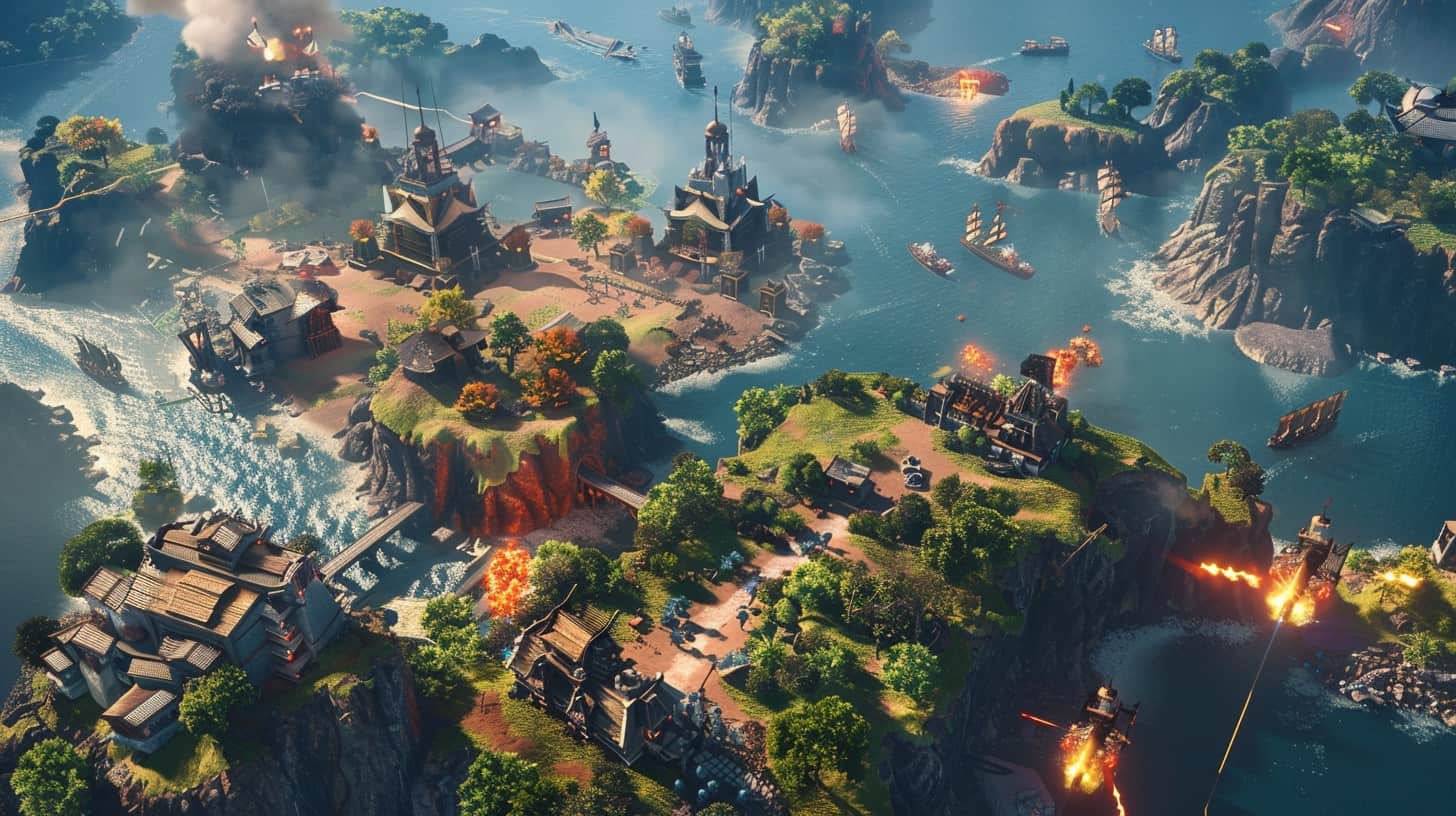
In strategy games, thinking ahead is key. Players build empires or lead troops in battles, making quick decisions to outsmart the opponent.
Artillery Game Features
Artillery games let players control tanks or similar combat vehicles to battle opponents. Think of Worms: A Space Oddity and Death Tank. Players aim their shots carefully, taking into account angles, wind speed, and other factors that affect trajectory.
Success requires strategy as much as quick reflexes.
In these games, each player takes turns firing at the enemy, trying to calculate the perfect shot. You can play against a computer or friends. The destruction is not just about hitting your target but also choosing the right weapon from an arsenal for maximum impact.
Next up: Auto-Battler (Auto Chess) Games bring a different kind of strategy.
Auto-Battler (Auto Chess) Games
Auto-battler games, like Teamfight Tactics and Hearthstone Battlegrounds, challenge players to think ahead. In these strategy games, you place characters on a grid and watch them fight without direct control.
Success comes from knowing which characters work best together. This genre mixes luck and skill in exciting ways.
Real-Time Strategy (RTS) games are next. They push you to make quick decisions. You build bases, gather resources, and command armies all at once. RTS games require focus and fast thinking to win battles and manage your economy.
Real-Time Strategy (RTS) Games
Shifting from auto-chess, RTS games demand a blend of quick thinking and strategic planning. In these computer strategy games, players gather resources, build bases, and command armies in real-time battles.
Age of Empires and StarCraft are iconic examples that showcase the essence of the genre. Players must research technologies to gain an edge over their opponents while managing their units and structures efficiently.
RTS games stand out for their need for rapid decision-making alongside long-term strategizing. This unique combination makes them highly engaging for those who thrive on both tactical combat and overarching game management.
The thrill lies in outsmarting the opponent by making smart moves faster than they can react, ensuring every second counts on the battlefield.
Real-Time Tactics (RTT) Explained
Real-time tactics games, like StarCraft and Warcraft series, demand quick thinking and fast moves. Players control units and resources in real-time, but unlike real-time strategy games, there’s no base building or resource gathering.
Every decision impacts the battlefield right away. You command troops, plan attacks, and take over territories. It’s all about tactics—using what you have wisely to win fights.
Success in RTT games relies on understanding each unit’s strengths and weaknesses. You must know when to strike or retreat. These games blend strategy with fast-paced action, making every match a new challenge to overcome.
Fans of geeky hobbies or those who enjoy intense multiplayer online battle arenas will find real excitement here. No two battles are the same, offering endless hours of gameplay for players looking for a deep tactical experience.
Multiplayer Online Battle Arena (MOBA) Games
Shifting from real-time tactics, MOBA games bring a new layer to strategy gaming. In these online role-playing games, every player controls one character with special abilities. Games like League of Legends and Dota 2 are perfect examples.
Each hero fights in a team against another team on a battlefield map. The goal? To destroy the enemy’s base.
MOBA blends action role-playing game elements and tactical plays beautifully. Players must work together, combining their characters’ unique powers to win. It’s not just about fighting; it’s also about strategy.
Deciding when to attack or defend can change the game’s outcome drastically. These matches happen online, connecting players worldwide for competitive play in battle arenas crafted for intense showdowns.
Tower Defense Game Strategies
Tower defense games like Plants vs. Zombies and Bloons TD challenge players to defend their territory from waves of enemies. Success depends on strategic planning and the efficient use of available resources.
- Place defensive structures wisely to cover all paths enemies might take.
- Balance your budget; don’t overspend on one tower type.
- Upgrade towers instead of building many at the lowest level.
- Learn enemy patterns and prepare defenses accordingly.
- Use a mix of tower types to tackle different enemy types.
- Prioritize high-damage towers near the path’s start.
- Save some resources for emergency situations.
- Observe how towers perform and adjust your strategy mid-game if needed.
- Take advantage of terrain features that can slow down or reroute enemies.
- Practice with different tower combinations to find the most effective setup.
Each decision impacts your game’s outcome, so think ahead and adapt quickly to new threats.
Turn-Based Strategy (TBS) Insights
Turn-based strategy (TBS) games, like Civilization VI and XCOM 2, require players to wait their turn. Each player makes moves or decisions that can change the game’s outcome. This genre offers a chess-like experience where thinking ahead is key.
Players plan their actions in advance, considering possible enemy moves.
In TBS games, every decision matters. These titles test your brain with challenges and strategies that evolve as the game progresses. Unlike real-time games where quick reactions are crucial, TBS games give you time to analyze the battlefield and make smart choices.
Civilizations rise and fall based on your ability to manage resources, armies, and diplomacy effectively in these turn-based adventures.
Turn-Based Tactics (TBT) Dynamics
In Turn-Based Tactics games, players move characters on a grid to fight enemies. Games like Fire Emblem and Advance Wars show this well. You plan each step, attack, or defense in your turn.
This makes you think hard about every move.
These games mix strategy with careful planning. Your choices really matter here. They let you control armies or single heroes on battle maps. Each decision can lead to victory or defeat.
Fans of geeky hobbies and strategy love these challenges for their depth and need for smart tactics.
Puzzle Game Varieties

Puzzle games make you think and solve problems. From trivia to logic, these games test your brain in fun ways.
Trivia Game Formats
Trivia games test your knowledge on various topics. Examples like Trivia Crack and QuizUp let players answer questions in different categories. These games come in many formats. Some use multiple-choice questions, while others ask for true or false answers.
Players can compete against friends or match up with random opponents online. This genre includes geeky hobbies and reveals the picture game styles where guessing an image correctly scores points.
In these trivia challenges, timing often matters—fast responses earn more points. You might face a racing simulator question one minute and a first-person shooter theme the next, keeping you on your toes.
From sandbox themes to role-playing video game scenarios, the variety keeps gamers coming back for more. Each session offers new questions, making it hard to predict what’s next but always exciting to learn something new or show off your knowledge across a broad spectrum of subjects.
Logic Game Puzzles
Moving from trivia games, logic game puzzles challenge your brain in a different way. These games require sharp thinking and problem-solving skills. You must use clues to solve tough puzzles.
The Room and The Witness are perfect examples of this genre. In these games, every puzzle is like a mystery waiting for you to crack it open.
Logic game puzzles test your reasoning ability. They make you think deeply to find solutions. Games like The Room challenge you with complex problems hidden in intricate designs. On the other hand, The Witness places you in an open world filled with puzzles that blend into the environment itself.
Both games demand that you pay close attention to details and think logically to progress.
Tile-Matching Game Fundamentals
In tile-matching games like Bejeweled and Candy Crush Saga, you move tiles to align with others that match. This makes them disappear and scores points. These games have simple rules but challenge your strategy and quick thinking.
You look for patterns, plan moves ahead, and react fast to changes on the board.
These games keep track of your score, often adding more difficult levels as you advance. Each level introduces new obstacles or goals, making the game harder and more engaging. Fans of puzzle genres find these features appealing since they test both speed and intellect without needing complex controls or a deep understanding of game mechanics.
Sports and Racing Game Excitement

Get ready for thrills in sports and racing video games – feel the rush of competition and speed. Explore this genre to find your next big gaming adventure.
Team Sports Games
Team sports games like FIFA series and NBA 2K series capture the thrill of being on a real team. Players get to experience the excitement of scoring goals or baskets from their living rooms.
- Team sports games simulate popular sports, including football, basketball, and baseball, letting fans control famous teams.
- Examples like FIFA bring soccer fields to life, while NBA 2K showcases intense basketball courts action.
- Gamers play against others in online matches, feeling the pressure and joy of real-world competitions.
- These games update yearly with new features and rosters, keeping fans returning for more.
- Strategies in these games need quick thinking and sharp skills, much like actual sports.
- Players manage teams in some modes, buying and selling athletes to build unbeatable squads.
- Training sessions help improve your players’ abilities, mirroring true athletic progression.
- Esport tournaments have grown around these titles, offering a stage for skilled gamers to shine.
- Sportsmanship matters even in digital arenas, promoting fair play among participants.
- Customization options let fans design uniforms and logos, adding a personal touch to their teams.
Each point brings players closer to understanding why team sports games remain a favorite genre among gaming enthusiasts who cherish both competition and the spirit of teamwork found in every match they play online or offline.
Racing Game Speeds
Leaving the field and hitting the track, racing game speeds thrill players with their fast-paced action. Racing simulators like F1 2021 and the Gran Turismo series offer a taste of what it’s like to drive a race car or motorcycle.
These games nail the feeling of speed and competition.
Players learn to master tracks, improve lap times, and compete against others in these high-speed challenges. From choosing the right vehicle to tweaking its performance for each race, gamers dive deep into this genre.
It’s all about crossing the finish line first and beating records along the way.
Esport Competitive Game Scene
Esports turns gaming into a pro sport. Games like League of Legends and Dota 2 lead the way. Players from around the world form teams to compete for big prizes. They play in front of fans, both live and online.
Teams work hard to win these games. They practice every day, study their opponents, and plan strategies. Fans watch matches on streaming sites, cheering for their favorite teams. Esports has become a huge part of geeky hobbies, just like traditional sports.
Sports-Based Fighting Games
Sports-based fighting games bring the thrill of combat sports right to your screen. Think UFC and Fight Night series—they’re at the top. Players get to step into the shoes of their favorite fighters, throwing punches and executing swift kicks with precision.
The controls are direct; you feel every hit land, making each match intense.
These games shine because they mix real-world sports rules with interactive gameplay. Fans can recreate famous bouts or dream up new matchups. With detailed graphics and life-like surroundings, these titles offer an immersive experience.
Whether practicing in single-player modes or challenging friends online, gamers find endless excitement here—proving that virtual rings pack just as much punch as real ones.
Individual Sports Games
After exploring sports-based fighting games, we shift our focus to individual sports games. These titles simulate sports like golf and tennis, offering fans immersive experiences.
- PGA Tour series replicates the challenge and excitement of professional golf tournaments. Players experience realistic golf physics and famous courses.
- Top Spin series lets players serve, volley, and smash their way through matches. It captures the finesse of professional tennis.
- Individual sports games often feature career modes, where players start as rookies and climb up the ranks in their chosen sport.
- Realistic graphics create an immersive atmosphere that mirrors watching a live event.
- Customization options allow users to tailor their athletes’ appearances and gear for a personal touch in the game.
- Training modes help players improve their skills through practice drills and challenges specific to each sport.
- Online multiplayer competitions enable gamers to compete against others worldwide, heightening the stakes.
- Leaderboards track high scores and achievements, motivating players to master their chosen sport.
- Special events within the game mimic real-life tournaments, offering unique challenges outside regular gameplay.
- Updates and DLC (Downloadable Content) keep these games fresh with new courses, athletes, and gear inspired by ongoing seasons in real-world sports.
These individual sports games give geeks who love athletics a chance to live out their pro athlete dreams from home – hitting perfect shots on world-famous golf courses or serving aces in grand slam tennis arenas without leaving their gaming setup.
Exploring Other Notable Game Genres
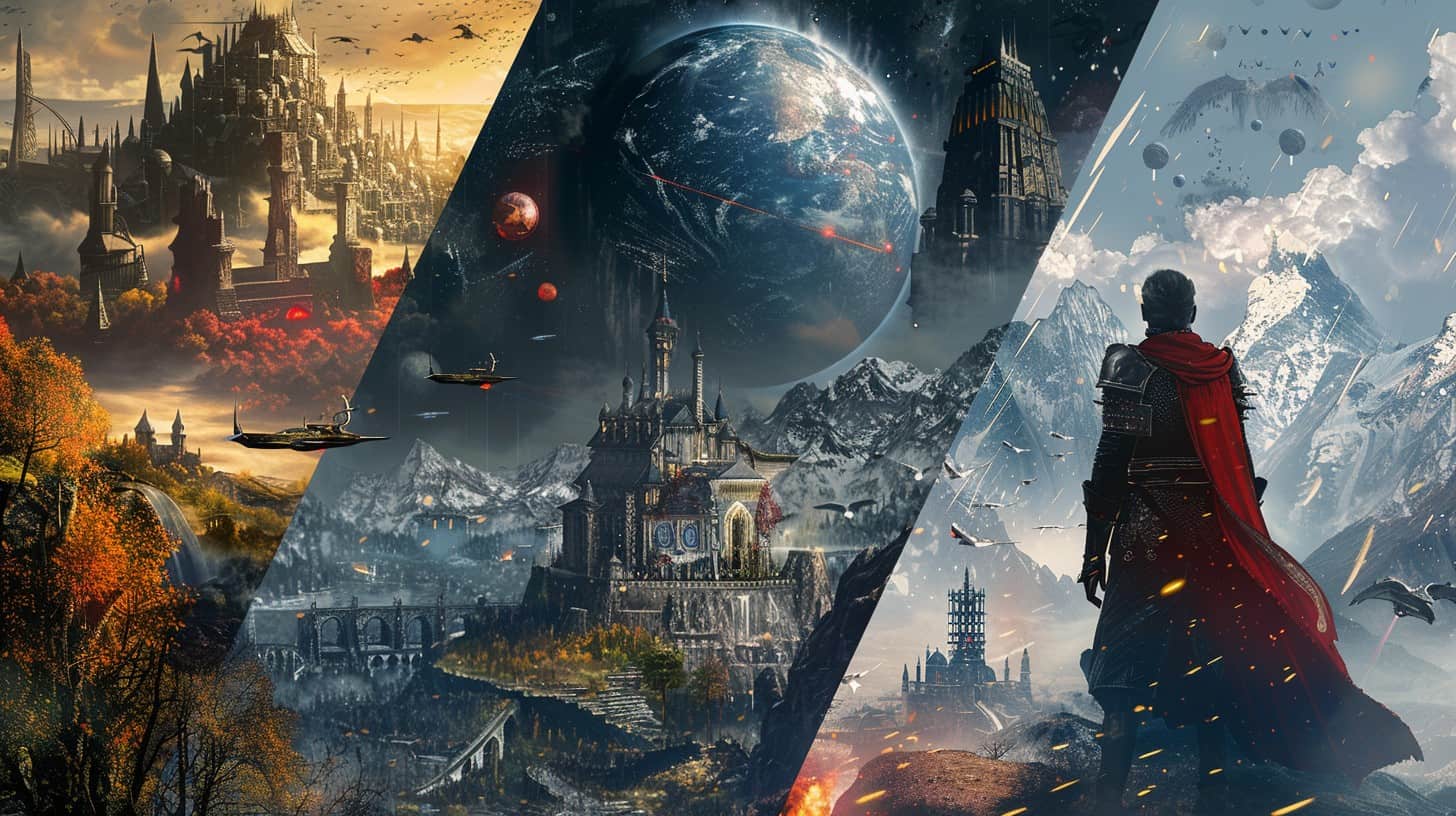
In the sea of game types, some stand out with unique fun. Think easy-to-play mobile games, lively group contests, or calm clicker challenges… There’s always something new to catch your eye and keep you coming back for more.
So, why not jump into these lesser-known lands next?
Idle Game Engagement
Idle games grab you with simple play. You click, earn money or points, then upgrade to earn faster without doing much. Games like Cookie Clicker and Adventure Capitalist shine here.
They keep players coming back with minimal effort needed.
These games fit perfectly into a busy life or when multitasking. You feel progress even when focusing elsewhere, making idle gaming addicting. It’s the ease of increasing numbers and achievements that hooks you in for hours.
Casual Game Play Styles
Casual games are created for a broad audience, offering easy and enjoyable gameplay. These games often involve simple mechanics and require minimal time commitment, making them perfect for quick entertainment during short breaks or while on the go.
Examples of popular casual games include Candy Crush Saga and Angry Birds, which have captured the attention of millions with their addictive yet straightforward gameplay.
Casual game styles cater to diverse interests, from puzzle-solving to strategic decision-making. They typically feature colorful graphics and lighthearted themes that appeal to both experienced gamers and those new to gaming.
Whether it’s matching colorful candies or launching birds at pesky pigs, casual games provide a relaxing way to unwind without getting too immersed in complex storylines or intense challenges.
Party Game Fun
Party games are all about getting together with friends or family to have a good time. These games are designed for social play, where everyone can join in on the fun. Examples of popular party games include the Mario Party series and the Jackbox Party Pack series.
They often involve a mix of different activities like trivia questions, drawing challenges, or mini-games that test your skills and creativity while bringing people together for some enjoyable competition.
So, when you’re looking for an entertaining way to spend time with your friends or family, consider trying out some party games. They’re perfect for gatherings and can provide hours of laughter and friendly rivalry as everyone competes in various lighthearted challenges.
Programming Game Challenges
Programming game challenges require writing code to solve puzzles and overcome obstacles. These games test your problem-solving and coding skills, often with a focus on logic and creativity.
Examples of programming game challenges include titles like SpaceChem and The Incredible Machine. In these games, you’ll need to use programming concepts to manipulate elements within the game world and achieve specific objectives, offering an engaging way to learn or practice coding in a fun and interactive environment.
While playing programming game challenges, you’ll encounter various scenarios that demand inventive solutions through coding. These experiences can help improve your understanding of coding principles by applying them in practical situations, making it an enjoyable educational tool for aspiring programmers or anyone looking to enhance their logical thinking abilities while having fun diving into the realm of coding adventures.
Board Games/Card Games Traditions
Transitioning from the complexities of programming game challenges, let’s delve into the rich traditions surrounding board games and card games. Digital incarnations of these traditional games like Hearthstone and Magic: The Gathering Arena endeavor to faithfully mirror their physical counterparts, offering engrossing experiences for enthusiasts.
These digital adaptations have ensured that gamers can continue to enjoy classic board and card games while also introducing them to a new generation of players. Whether it’s strategic card battles or tactical board game showdowns, these virtual renditions stay true to the essence of traditional gameplay while enhancing accessibility for all.
Specialized Game Genres
Specialized Game Genres form a diverse landscape within the gaming world, catering to niche interests and offering unique experiences for players. If you’re intrigued by unconventional and distinctive game styles, there’s much more to discover in this fascinating realm.
Advergame Marketing
Advergame marketing involves creating games specifically for advertising. An example of this is Pepsi Invaders, a game made to promote Pepsi products. This type of marketing blends entertainment with brand promotion, aiming to engage the audience through interactive gameplay experiences while subtly conveying a brand’s message.
Companies use advergames as an innovative way to connect with their target market on digital platforms, enhancing brand awareness and fostering positive associations with their products or services.
These games often leverage popular gaming genres such as puzzle games, racing games, and first-person shooter games to captivate audiences and create memorable interactions that resonate beyond traditional advertising methods.
Art Game Creativity
Art games are all about expressing art. Journey is a good example of this kind of game. It focuses on creating an artistic experience, allowing players to explore and interpret the game’s visuals in their own way.
These games invite you to immerse yourself in visually stunning worlds and appreciate the creativity and emotion behind each design. They provide a unique way to experience and engage with different forms of artistic expression, making them a captivating genre for those who appreciate visual arts and creativity in gaming.
Art games inspire players to see video games as more than just entertainment; they’re a canvas for meaningful experiences, encouraging exploration of diverse perspectives through interactive art.
Moving on from “Art Game Creativity”, let’s delve into “Educational Game Benefits”.
Educational Game Benefits
Educational games offer valuable learning experiences. They teach various subjects, such as history, geography, and problem-solving skills. Examples of educational games include “Oregon Trail” and the “Carmen Sandiego” series.
These games engage players while imparting knowledge, making learning fun and interactive.
These games are designed to be both enjoyable and instructive – a perfect combination for geeks looking to expand their knowledge in an entertaining way. Educational games hold the potential to make learning more engaging for individuals of all ages by combining entertainment with education effectively.
Exergame Fitness
Exergame fitness is a blend of exercise and video gameplay. These games get you moving while having fun. Examples include Wii Fit and Ring Fit Adventure, offering activities that make you active while playing.
The game helps improve physical fitness by making it enjoyable to move around. It’s like turning exercise into an exciting challenge that keeps you engaged for longer periods compared to regular workouts.
Massively Multiplayer Online (MMO) Games
Massively Multiplayer Online (MMO) Games bring together a large number of players in a single virtual world. This means thousands of people can play in the same game at the same time, making these games vast and highly interactive.
Examples of MMOs include well-known titles such as World of Warcraft and Second Life. In these games, players have their own characters and can interact with other players’ characters while accomplishing various tasks or missions.
These games are designed to be played online, which means you’ll need an internet connection to participate. Players often join forces with others to tackle more challenging quests or battles against formidable enemies.
The social aspect is a crucial part of MMOs, enhancing the experience through cooperation and competition among many individuals from all around the globe.
People Also Ask
What’s the best game for a geeky hobby?
Sandbox games, hands down. They let you create and explore worlds with no end in sight. Think Minecraft or Terraria–unlimited possibilities, just like your imagination.
How do I pick between action role-playing games and turn-based games?
It depends on your pace. Love fast, intense battles? Go for action role-playing games like Diablo clones or Vainglory. Prefer thinking through each move? Turn-based games, where strategy wins over speed, are your best bet.
Can you recommend any unique computer game genres?
Sure! Ever heard of blobbers or physics games? Blobbers take you through dungeons from a first-person view—pure nostalgia! Physics games, on the other hand, challenge your understanding of real-world physics to solve puzzles—fun and brainy at the same time.
What’s new in open world RPGs for 2024?
Open world RPGs have gone next-level with more immersive experiences. Now, they’re blending elements from hidden object games to artificial life simulations—making every corner of their vast worlds alive and interactive.
Are there any casual genres for quick fun?
Absolutely! Hidden object games offer quick doses of fun with ‘reveal the picture’ gameplay that sharpens your observation skills without taking up too much time—a perfect break from reality.
